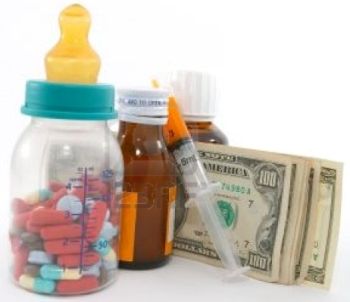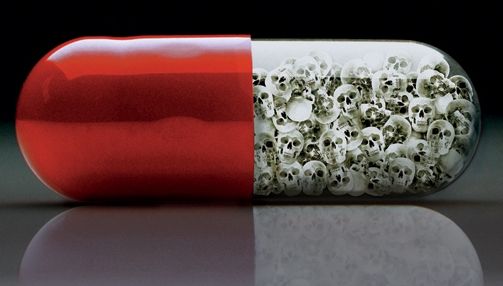
Publisher:
Bonnie King
CONTACT:
Newsroom@Salem-news.com
Advertising:
Adsales@Salem-news.com

~Truth~
~Justice~
~Peace~
TJP
Sep-27-2011 00:33

 TweetFollow @OregonNews
TweetFollow @OregonNews
Is Purdue Pharma Using Kids as Guinea Pigs?
Marianne Skolek Salem-News.com"It is not truth that matters, but victory." Adolf Hitler
 Photos from the story: If You Think Your Kids Are Safe In Juvenile Jails.......THINK AGAIN!!! - my.opera.com |
(MYRTLE BEACH, S.C.) - On April 23, 2011 I wrote an article for Salem-News.com on children being used as guinea pigs by Purdue Pharma in clinical trials of OxyContin -- ages 6 to 16. See link below.

I questioned why the FDA and government agencies were allowing these clinical trials to take place in view of the epidemic this country has experienced with death, addiction and abuse because of the lies used in the marketing of OxyContin.
In the recruitment filing Purdue Pharma was using to market for young children, it said "This study is currently recruiting participants - verified on March 2011 by Purdue Pharma." Shortly after my article was published, there was a change of recruitment in June 2011 where Purdue Pharma indicates they are not recruiting participants. This doesn't mean that they won't be recruiting children at a later date -- but it does keep the children in the U.S. and Canada safe (for now) from becoming addicted to a very dangerous drug that Purdue Pharma is aware should not be given to children.
I received the below information by mail from someone in the medical profession who questions Purdue Pharma being allowed to market OxyContin to children in the treatment of pain. Maybe the FDA would like to respond to the following questions and statements before our childrens' lives are taken by Purdue Pharma in death and addiction: For Dr. Steiner to be listed as an investigator condoning the administration of up to 240 mg/day of OxyCondone to a child is absolutely criminal.

Study of Oxycodone HCI CR 20 to 240 mg/day for the management of moderate to severe malignant or nonmalignant pain - Investigator: Deborah Steiner, MD (Purdue Pharma):
1. In the study: Purdue Pharma LP Clinical Trials. gov Identifier: NCT01369615, the operational definition of "moderate to severe pain" is based on an expert investigator's judgement. What would be the reliability of accurate diagnostic agreement if untrained, non specialized pain management doctors who are practicing in the field are eventually given the power to determine what non malignant "moderate to severe pain" is?
2. If the use of this drug is approved based on this study, couldn't a parent's pressure that they don't want their child to be in any pain unduly influence the prescription of such opiates by doctors to kids?
3. Once a child is prescribed, the doses currently being evaluated in this study, there is no way addressed as to assess when to eventually decrease or stop these medications. Unlike antibiotics where a full course of treatment is needed in pain management how will we know when it is time to cut down or stop?
4. Based upon known literature already established by the FDA, if a child were to actually take this study's recommendations of an around the clock "20-mg daily dose of Oxycodone for at least 2 weeks" the chances of biological dependence could be serious.
5. There is nothing in the study which addressed how the child's possible dependence would then be treated. Would an undereducated, non specialist clinician in the field just let the child go "cold turkey." Remember an opiate has both the potential for biological and psychological addiction. Where in this study are these complex issues addressed?
6. There is current data being investigated by a multi discipline high level task force in New York State which has identified a real present danger of a potential "gateway" from prescription opiates to street heroin. An Oxycodone pill on the street may cost $10 - 15 per pill. Law enforcement has shown that it is cheaper and easier for many to turn from opiates to heroin. So what starts as a medically prescribed opiate for pain may turn into a street addiction of heroin.
7. The ages proposed in this study are the adolescent years, i.e. 13 - 16. A prime time or vulnerability of substance abuse. The study doesn't address what it would be like for an adolescent who is potentially already self medicating with alcohol for example to also now be introduced to an opiate. Are we creating the potential for cross and complex mixed addictions?
8. There is no routine testing in the study that the population is not also doing other substances, i.e. alcohol at the same time of the administration of Oxycodone so how do we know what is really treating the pain?
9. In the real world of adolescent medicine, what are the chances that a 16 year old who has now been given a legal prescription for Oxycodone won't also try to mix it with alcohol or other substances to get high?
10. These pills won't be cheap. In rising health care costs introducing another patented pain killer may make the taxpayer and health insurer think long and hard about the cost benefit ratio compared to already available generics.
So what do you think FDA and law officials in every state in the country -- are you going to allow Purdue Pharma to continue their reign of death and addiction -- but now directed at our children? Or will you protect our children from the continued Holocaust you have allowed Purdue Pharma to perpetuate in this country?
http://www.salem-news.com/
LP - "Your talent is God's gift to you. What you do with it is your gift back to God." Leo Buscaglia. .
Safety of Twice Daily Oxycodone Hydrochloride Controlled-release Tablets in Children With Moderate to Severe Malignant and/ or Nonmalignant Pain Requiring Opioids
| Sponsor: | Purdue Pharma LP |
|---|---|
| Information provided by: | Purdue Pharma LP |
| ClinicalTrials.gov Identifier: | NCT01192295 |
| Condition | Intervention | Phase |
|---|---|---|
| Pain |
Drug: Oxycodone HCl controlled-release tablets |
Phase III |
| Study Type: | Interventional |
| Study Design: | Allocation: Non-Randomized Endpoint Classification: Safety Study Intervention Model: Single Group Assignment Masking: Open Label Primary Purpose: Treatment |
| Official Title: | An Open-label, Multicenter Study of the Safety of Twice Daily Oxycodone Hydrochloride Controlled-release Tablets in Opioid Experienced Children From Ages 6 to 16 Years Old, Inclusive, With Moderate to Severe Malignant and/or Nonmalignant Pain Requiring Opioid Analgesics |
- The number of participants with adverse events as a measure of safety. [ Time Frame: Up to 4 weeks (during the study) and 7-10 days poststudy (safety follow-up assessment). ] [ Designated as safety issue: Yes ]
- To characterize the efficacy and provide additional pharmacokinetics (PK) data of oxycodone hydrochloride controlled-release tablets [ Time Frame: 2-4 and 4-6 hours (hrs) after the first dose on Day 1 and immediately pre-dose and 2-4 hrs after dose at Visit 2 and/or Visit 3. ] [ Designated as safety issue: No ]
To characterize the efficacy and provide additional pharmacokinetics (PK) data for a population PK model of oxycodone hydrochloride controlled-release tablets in opioid tolerant pediatric patients aged 6 to16 years, inclusive, with moderate to severe malignant and/or nonmalignant pain requiring opioid therapy.
| Estimated Enrollment: | 135 |
| Study Start Date: | November 2010 |
| Estimated Study Completion Date: | September 2011 |
| Estimated Primary Completion Date: | September 2011 (Final data collection date for primary outcome measure) |
| Arms | Assigned Interventions |
|---|---|
| Oxycodone HCl controlled-release: Experimental
Oxycodone hydrochloride (HCl) controlled-release (CR)
Intervention: Drug: Oxycodone HCl controlled-release tablets
|
Drug: Oxycodone HCl controlled-release tablets
Oxycodone HCl controlled-release tablets at strengths of 10, 15, 20, 30, or 40 mg (20 mg - 240 mg daily) every 12 hours.
|
| Ages Eligible for Study: | 6 Years to 16 Years |
| Genders Eligible for Study: | Both |
| Accepts Healthy Volunteers: | No |
- Male and female patients aged 6 to 16 years, inclusive, who are expected to require ongoing around-the-clock opioid treatment equivalent to at least 20-mg daily dose of oxycodone for at least 2 weeks for management of moderate to severe (based on the investigator's judgment) malignant or nonmalignant pain.
- Patients must be opioid tolerant, ie, have been treated with opioids for at least the 5 consecutive days prior to dosing and with at least 20 mg daily of oxycodone or the equivalent during at least the last 48 hours prior to the start of study drug dosing and have tolerated the therapy, as demonstrated at the start of study drug dosing.
- Patients who are currently using transdermal fentanyl should have been on the patch for at least 3 days before removing the patch and oxycodone hydrochloride (HCl) controlled-release (CR) treatment can only be initiated at least 18 hours following the removal of the transdermal fentanyl patch.
- Patients must not require more than a 240-mg total daily dose of oxycodone HCl CR tablets.
- Patients must be willing and able to swallow the oxycodone HCl CR tablets whole.
- Patients must not be currently on an investigational medication/therapy at the start of screening or during the study.
- Female patients who are pregnant or lactating.
- Patients who are allergic to oxycodone or have a history of allergies to other opioids (this criterion does not include patients who have experienced common opioid side effects [eg, nausea, constipation]).
- Patients who have received epidural opioids < 2 hours prior to the first dose of study drug or who have received epidural morphine < 12 hours prior to the first dose of study drug.
- Patients who are contraindicated for the use of opioids.
- Patients who are contraindicated for blood sampling.
- Patients who are currently being maintained on methadone for pain.
- Patients who have any planned surgery during the course of the study, with the exception of the placement of central or peripheral venous access devices.
- Patients who have had surgery within 120 hours prior to Day 1 (day of first dose of study drug).
| Contact: Deborah Steiner, MD | 203-588-7413 | deborah.steiner@pharma.com |
| United States, Arizona | |
| Maricopa Medical Center | Recruiting |
| Phoenix, Arizona, United States, 85008 | |
| Contact: David Rosenberg, MD | |
| Principal Investigator: David Rosenberg, MD | |
| United States, California | |
| Loma Linda University Medical Center | Recruiting |
| Loma Linda, California, United States, 92354 | |
| Contact: Peter Przekop, MD | |
| Principal Investigator: Peter Przekop, MD | |
| LS Packard Children's Hospital | Recruiting |
| Palo Alto, California, United States, 94304 | |
| Contact: Elliot Krane, MD | |
| Principal Investigator: Elliot Krane, MD | |
| Bayview Research Group, LLC | Recruiting |
| Paramount, California, United States, 90723 | |
| Contact: Mohammad Riaz, MD | |
| Principal Investigator: Mohammad Riaz, MD | |
| United States, Colorado | |
| The Children's Hospital | Recruiting |
| Aurora, Colorado, United States, 80045 | |
| Contact: Jeffrey Galinkin, MD | |
| Principal Investigator: Jeffrey Galinkin, MD | |
| United States, Pennsylvania | |
| Penn State Hershey Children's Hospital | Recruiting |
| Hershey, Pennsylvania, United States, 17033 | |
| Contact: Andrew S. Freiberg, MD | |
| Principal Investigator: Andrew S. Freiberg, MD | |
| United States, Texas | |
| Children's Medical Ctr of Dallas | Recruiting |
| Dallas, Texas, United States, 75235 | |
| Contact: Peter Szmuk, MD | |
| Principal Investigator: Peter Szmuk, MD | |
| Estonia | |
| Tallinn Children's Hospital | Recruiting |
| Tallinn, Estonia, 13419 | |
| Contact: Kadri Saks, MD | |
| Principal Investigator: Kadri Saks, MD | |
| Tartu University Hospital | Recruiting |
| Tartu, Estonia, 51014 | |
| Contact: Karin Varik, MD, Ph.D. | |
| Principal Investigator: Karin Varik, MD, Ph.D. | |
Additional Information:
No publications provided
| Responsible Party: | Purdue Pharma LP ( Medical Monitor ) |
| ClinicalTrials.gov Identifier: | NCT01192295 History of Changes |
| Other Study ID Numbers: | OTR3001, 2010-020471-23 |
| Study First Received: | August 30, 2010 |
| Last Updated: | March 28, 2011 |
| Health Authority: | United States: Food and Drug Administration; Estonia: State Agency of Medicines |
Keywords provided by Purdue Pharma LP:
| Malignant pain Nonmalignant pain Pediatric Opioid Moderate to severe malignant or nonmalignant pain |
Additional relevant MeSH terms:
| Oxycodone Analgesics, Opioid Analgesics Sensory System Agents Peripheral Nervous System Agents Physiological Effects of Drugs |
Pharmacologic Actions Central Nervous System Agents Therapeutic Uses Central Nervous System Depressants Narcotics |
ClinicalTrials.gov processed this record on April 14, 2011
| HomeSearchStudy TopicsGlossary |
 |
 |
|
 |
|
 |
|
 |
 |
 |
|
 |
 | ||||||||||||||||||||||||||||||||||||
| Sponsor: | Purdue Pharma LP |
|---|---|
| Information provided by: | Purdue Pharma LP |
| ClinicalTrials.gov Identifier: | NCT01369615 |
 Purpose
Purpose
| Condition | Intervention | Phase |
|---|---|---|
| Pain |
Drug: Oxycodone hydrochloride controlled-release tablets |
Phase III |
| Study Type: | Interventional |
| Study Design: | Allocation: Non-Randomized Endpoint Classification: Safety Study Intervention Model: Single Group Assignment Masking: Open Label |
| Official Title: | An Open-label, Extension Study to Assess the Long-Term Safety of Twice Daily Oxycodone Hydrochloride Controlled-release Tablets in Opioid Experienced Children Who Completed the OTR3001 Study |
- The number of participants with adverse events as a measure of safety. [ Time Frame: Up to 6 months (during the study) and 7-10 days poststudy (safety follow-up assessment). ] [ Designated as safety issue: Yes ]
| Estimated Enrollment: | 135 |
| Study Start Date: | September 2011 |
| Estimated Study Completion Date: | July 2012 |
| Estimated Primary Completion Date: | July 2012 (Final data collection date for primary outcome measure) |
| Arms | Assigned Interventions |
|---|---|
| Oxycodone HCl controlled-release: Experimental
Oxycodone hydrochloride (HCl) controlled-release
Intervention: Drug: Oxycodone hydrochloride controlled-release tablets
|
Drug: Oxycodone hydrochloride controlled-release tablets
Oxycodone hydrochloride controlled-release tablets at strengths of 10, 15, 20, 30, or 40 mg (20 mg to 240 mg daily) every 12 hours.
Other Name: OxyContin
|
 Eligibility
Eligibility| Ages Eligible for Study: | 6 Years to 17 Years |
| Genders Eligible for Study: | Both |
| Accepts Healthy Volunteers: | No |
- Male and female patients aged 6 to 17 years, inclusive, who completed the 4-week study drug treatment in study OTR3001 and who, based on the investigator's judgment, will benefit from continuing treatment with oxycodone HCl CR 20 to 240 mg/day for the management of moderate to severe malignant or nonmalignant pain;
- Patients must have tolerated the oxycodone HCl CR therapy in OTR3001 as demonstrated at the start of the study;
- Patients must be willing and able to swallow the oxycodone HCl CR tablets whole.
- Patients with ongoing adverse events in OTR3001 that, in the investigator's opinion, disqualify them from participation in the study;
- Female patients who are pregnant or lactating;
- Patients requiring opioid at doses equivalent to < 20 mg/day or > 240 mg/day oxycodone for treatment of their malignant or nonmalignant pain;
- Patients who are allergic to oxycodone or have a history of allergies to other opioids (this criterion does not include patients who have experienced common opioid side effects [eg, nausea, constipation]);
- Patients who are contraindicated for the use of opioids;
- Patients who are currently being maintained on methadone for pain;
- Patients who have an abnormality on vital signs, physical examination, or laboratory testing significant enough that the investigator deems the patient is not appropriate for the study;
- Patients who have any planned surgery during the course of the study, with the exception of the placement of central or peripheral venous access devices;
- Patients currently taking an investigational medication/therapy other than the study drug (oxycodone HCl CR) at the start of screening or during the study.
 Contacts and Locations
Contacts and Locations| Contact: Deborah Steiner, MD | 203-588-7413 | Deborah.steiner@pharma.com |
 More Information
More Information
Additional Information:
No publications provided
| Responsible Party: | Medical Monitor, Purdue Pharma LP |
| ClinicalTrials.gov Identifier: | NCT01369615 History of Changes |
| Other Study ID Numbers: | OTR3002, 2011-002235-26 |
| Study First Received: | June 7, 2011 |
| Last Updated: | June 8, 2011 |
| Health Authority: | United States: Food and Drug Administration |
Keywords provided by Purdue Pharma LP:
| Malignant pain Nonmalignant pain Pain |
Pediatric Opioid Moderate to severe |
Additional relevant MeSH terms:
| Oxycodone Narcotics Central Nervous System Depressants Physiological Effects of Drugs Pharmacologic Actions |
Sensory System Agents Peripheral Nervous System Agents Central Nervous System Agents Therapeutic Uses Analgesics, Opioid |
ClinicalTrials.gov processed this record on September 25, 2011
http://www.salem-news.com/by_
 Salem-News.com Reporter Marianne Skolek, is an Activist for Victims of OxyContin and Purdue Pharma throughout the United States and Canada. In July 2007, she testified against Purdue Pharma in Federal Court in Virginia at the sentencing of their three CEO's - Michael Friedman, Howard Udell and Paul Goldenheim - who pleaded guilty to charges of marketing OxyContin as less likely to be addictive or abused to physicians and patients. She also testified against Purdue Pharma at a Judiciary Hearing of the U.S. Senate in July 2007. Marianne works with government agencies and private attorneys in having a voice for her daughter Jill, who died in 2002 after being prescribed OxyContin, as well as the voice for scores of victims of OxyContin. She has been involved in her work for the past 8-1/2 years and is currently working on a book that exposes Purdue Pharma for their continued criminal marketing of OxyContin.
Salem-News.com Reporter Marianne Skolek, is an Activist for Victims of OxyContin and Purdue Pharma throughout the United States and Canada. In July 2007, she testified against Purdue Pharma in Federal Court in Virginia at the sentencing of their three CEO's - Michael Friedman, Howard Udell and Paul Goldenheim - who pleaded guilty to charges of marketing OxyContin as less likely to be addictive or abused to physicians and patients. She also testified against Purdue Pharma at a Judiciary Hearing of the U.S. Senate in July 2007. Marianne works with government agencies and private attorneys in having a voice for her daughter Jill, who died in 2002 after being prescribed OxyContin, as well as the voice for scores of victims of OxyContin. She has been involved in her work for the past 8-1/2 years and is currently working on a book that exposes Purdue Pharma for their continued criminal marketing of OxyContin.
Marianne is a nurse having graduated in 1991 as president of her graduating class. She also has a Paralegal certification. Marianne served on a Community Service Board for the Courier News, a Gannet newspaper in NJ writing articles predominantly regarding AIDS patients and their emotional issues. She was awarded a Community Service Award in 1993 by the Hunterdon County, NJ HIV/AIDS Task Force in recognition of and appreciation for the donated time, energy and love in facilitating a Support Group for persons with HIV/AIDS.
National Activist for Victims of OxyContin and
Purdue Pharma - a criminally convicted pharmaceutical company
Staff Writer, Salem-News.com
Quick Links
DINING
Willamette UniversityGoudy Commons Cafe
Dine on the Queen
Willamette Queen Sternwheeler
MUST SEE SALEM
Oregon Capitol ToursCapitol History Gateway
Willamette River Ride
Willamette Queen Sternwheeler
Historic Home Tours:
Deepwood Museum
The Bush House
Gaiety Hollow Garden
AUCTIONS - APPRAISALS
Auction Masters & AppraisalsCONSTRUCTION SERVICES
Roofing and ContractingSheridan, Ore.
ONLINE SHOPPING
Special Occasion DressesAdvertise with Salem-News
Contact:AdSales@Salem-News.com

googlec507860f6901db00.html



Terms of Service | Privacy Policy







All comments and messages are approved by people and self promotional links or unacceptable comments are denied.
Justice September 28, 2011 8:20 am (Pacific time)
Marianne I work on the pharmaceutical industry and Pediatric studies are performed to extend patent exclusivity for 6-months. I am not saying that is right for Oxycontin, but these studies are encourage by FDA for all NDA filed. For Purdue this means extra 1.8 billion in their pocket, and assumming they spend 150 million, there is a huge gain.
[Return to Top]©2025 Salem-News.com. All opinions expressed in this article are those of the author and do not necessarily reflect those of Salem-News.com.